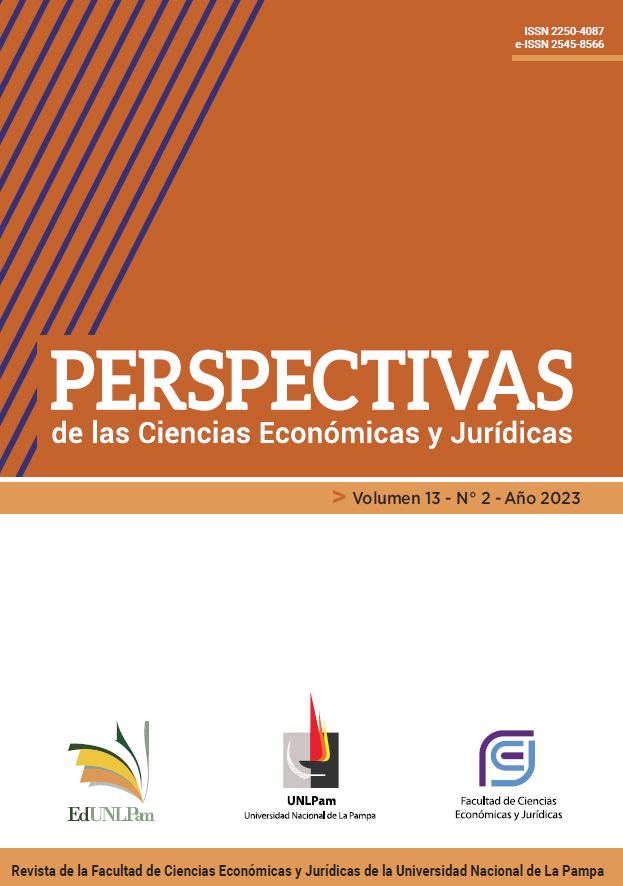El rol de las organizaciones sociocomunitarias en el acceso a la justicia
Socio-Community organizations and access to justice in the perspective of a woman who suffered gender-based violence
DOI:
https://doi.org/10.19137/perspectivas-2023-v13n2a04Keywords:
socio-community organizations; access to justice; gender-based violence; biographical case.Abstract
This article explores the role of socio-community organizations in access to justice, according to the perspective of a woman who suffered gender-based violence. Although it is related to a broader project that investigates the obstacles and determinants in access to justice based on the testimony of a variety of agents, we chose to present this biographical case because of its relevance. Indeed, the extensive analysis of the complainant’s account, obtained in the context of an interview and a focus group, allows us to conclude that the rapprochement with the organization operated as a turning point in his personal trajectory and in his journey through the Justice delivery system. We argue that the organization opened for her, paraphrasing the interviewee, a “giant door” by allowing her to recognize the violence suffered as a social, political and legal problem. At the same time, it increased the effectiveness of its judicial proceedings by promoting legal know-how and registering the request for justice and reparation for the rights infringed in the public sphere.
Downloads
References
Arfuch, L. (2006). El espacio biográfico. Dilemas de la subjetividad contemporánea. Fondo de Cultura Económica.
Asamblea General. (1948). Declaración Universal de Derechos Humanos. Naciones Unidas.
----------------------. (1966). Pacto Internacional de Derechos Civiles y Políticos. Naciones Unidas.
Bertaux, D. (1999). El enfoque biográfico, su validez y sus potencialidades. Revista Cahiers lnternationaux de Sociologie, LXIX (traducción TCU 0113020 de la Universidad de Costa Rica).
Birgin, H. y Kohen, B. (Comps.) (2006). Acceso a la justicia como garantía de igualdad: Instituciones, actores y experiencias comparadas. Biblós.
Bourdieu, P. (2000). La Fuerza del Derecho. Editorial Uniandes.
Cobo Bedía, R. (2005). El género en las ciencias sociales. En Cuadernos de Trabajo Social, 18, pp. 249-258. DOI: 10.5209/CORTES.8441
Conferencia Internacional Americana (1948). Declaración Americana de Derechos y Deberes del Hombre. Colombia.
Femenías, M. L. (2018). Violencia contra las mujeres: obstáculos para enfrentarla. En Femenías, M. L. y Novoa, S. M. (Coord) Mujeres en el laberinto de la justicia. Prohistoria ediciones.
Revel, J. (1996). Microanálisis y construcción de lo social. Entrepasados, 10, pp. 41-160,
Robles, D. (2011). El acceso a la justicia: aspectos teóricos, implicancias prácticas. En O. Salanueva y M. G. González (Comps.), Los pobres y el acceso a la justicia. Edulp.
Sautu, R.; Damiani, S.; González, D.; López, A. y Rossi, C. (2019). La interpretación subjetiva de la historia. Las perspectivas macro, meso y microsociales en la investigación biográfica. En E. Meccia (Dir.), Biografía y sociedad. Métodos y perspectivas. Ediciones UNL, Facultad de Humanidades y Ciencias/Eudeba.
Downloads
Published
Issue
Section
License
Aquellos autores/as que tengan publicaciones con esta revista, aceptan los términos siguientes:- Los autores/as conservarán sus derechos de autor y garantizarán a la revista el derecho de primera publicación de su obra, el cuál estará simultáneamente sujeto a la Licencia de reconocimiento de Creative Commons que permite a terceros compartir la obra siempre que se indique su autor y su primera publicación esta revista.
- Los autores/as podrán adoptar otros acuerdos de licencia no exclusiva de distribución de la versión de la obra publicada (p. ej.: depositarla en un archivo telemático institucional o publicarla en un volumen monográfico) siempre que se indique la publicación inicial en esta revista.
- Se permite y recomienda a los autores/as difundir su obra a través de Internet (p. ej.: en archivos telemáticos institucionales o en su página web) antes y durante el proceso de envío, lo cual puede producir intercambios interesantes y aumentar las citas de la obra publicada. (Véase El efecto del acceso abierto).











.png)



5.jpg)












